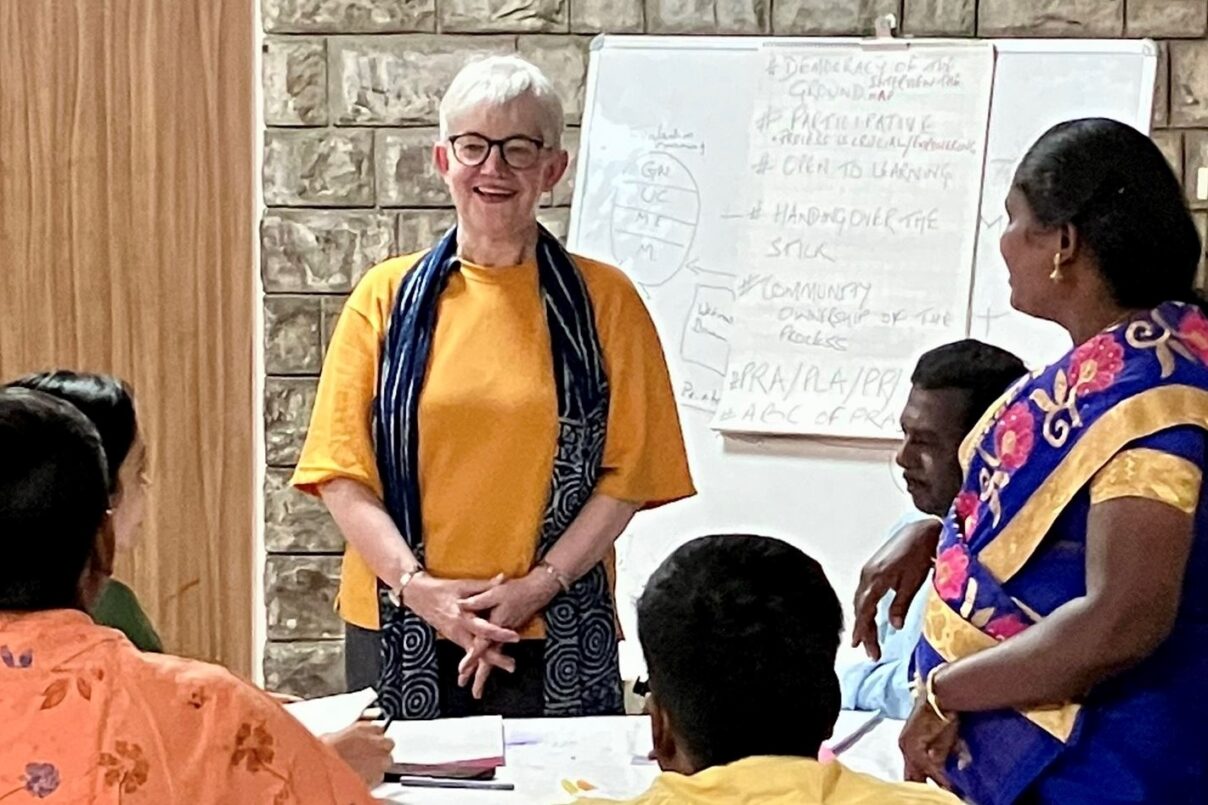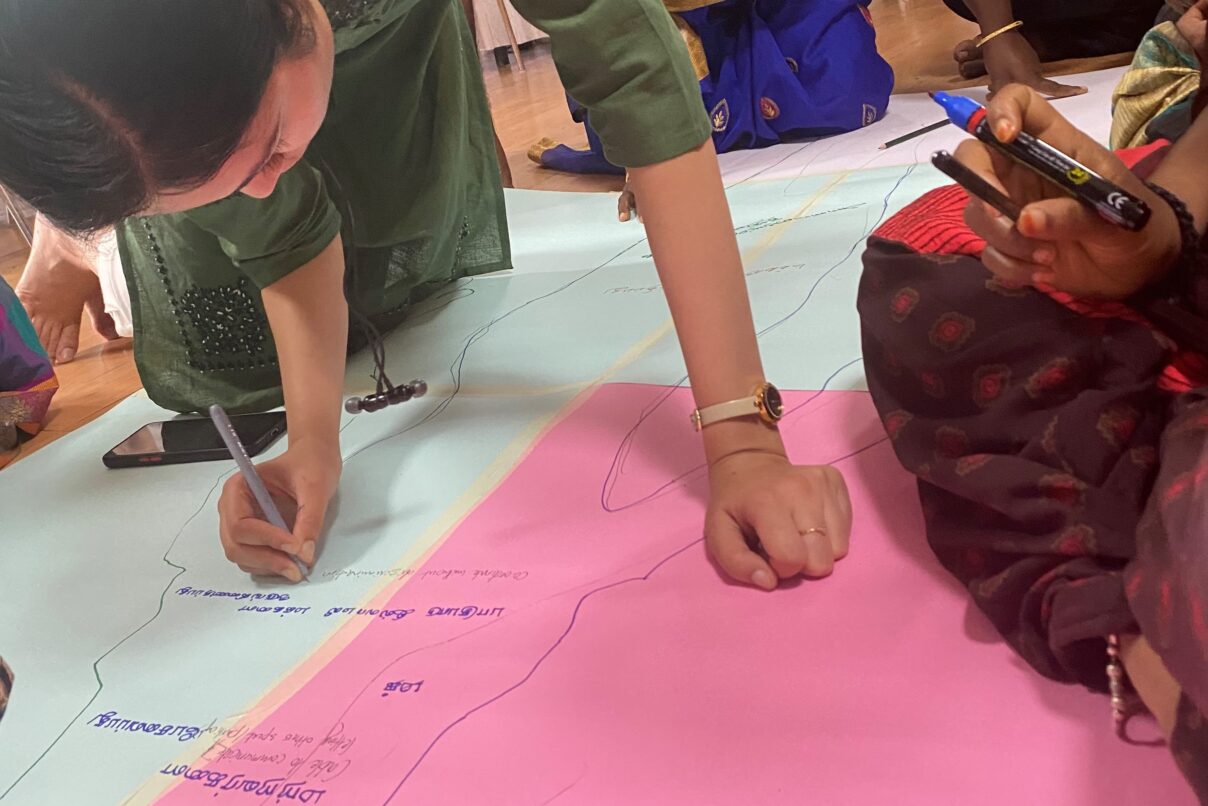Returning evaluation research to the communities where it belongs – an international challenge
Andrew Russell is a Professor in the Department of Anthropology and Co-Director of the Centre for Social Justice and Community Action, and Mary Robson is a Creative Facilitator in the Institute for Medical Humanities. Andrew and Mary were invited to India to take part in a workshop aimed at breaking down barriers for those participating in evaluation.
What is evaluation research?
Evaluation research is a cornerstone of community development, necessary to establish the effectiveness (or otherwise) of projects and other interventions in achieving the outcomes originally set. However, as an activity it has become an industry in its own right, dominated by professionals and institutions from the global North and elites in the global South.
As well as the skill sets necessary to participate as equals in evaluation research, the people who are the beneficiaries of the projects and interventions often have little opportunity to give their opinions in a free and fair environment. Evaluation research is a political as well as a skills-based activity. Frequently the viewpoints of a diversity of marginalised groups are not sought, are dismissed or ignored.

Providing people with power and agency
Praxis, the Institute for Participatory Practices, is an organisation based in Delhi, India, that aims to provide power and agency for people, particularly those in disadvantaged communities, over the actions and events that shape their lives. Praxis has recently revived a 2019 project that had to be halted during Covid. It aims to create a network of community evaluators in India. ‘Community’ in this case is defined as those who have done ground-level work and/or those who have lived experience of discrimination based on their identities. A three-day workshop aimed to give a group of 25 future community evaluators training in the methods used in evaluation research as well as the confidence to make sure their voices will be heard in future work.
Durham University’s contributions to the workshop
Mary and Andrew were invited to attend and contribute to the second day of the workshop, which was held at the YMCA in New Delhi. Eighteen of the participants were already associated with Praxis through a diverse range of projects and seven were affiliated to other groups and organisations in the NGO sector. Half of the participants came from North India and spoke Hindi as their first language; half were Tamil speakers from South India. Some spoke English, which remains a common additional language in India.
Mary is a specialist in Creative Facilitation – an approach used at Durham’s Institute for Medical Humanities that draws on arts-based and experimental techniques to sustain and enhance interdisciplinary and cross-sector collaborations. She worked alongside three Praxis facilitators, while Andrew acted as ethnographer for the session. They delivered three activities, all focused on listening and facilitation, that were designed to break down the barriers that normally surround people getting involved in evaluation.

The activities and evaluation
The first activity was a body-mapping exercise. One person from each language group lay on large sheets of paper on the floor and another participant drew around them. Participants then wrote the characteristics of a good facilitator within the body outline, and the things that make for a poor facilitator outside it. Contributions were translated, and the groups then shared and discussed what each had written.
The second exercise, ‘I Wonder’, is one that Mary has often used in English-language contexts. One of the group selects an issue that they want to share and gather advice on. Once the issue has been aired, the contributor stays silent and listens to what others have to say. Going around the group, participants start their comments and suggestions using the term ‘I wonder….’ . The idea is to create a space within which people can give ideas and advice to others without telling them what to do.
The first challenge was language. ‘I wonder’ doesn’t translate from English into Hindi or Tamil very well – for example in Hindi its associations are with surprise and astonishment rather than reflection. ‘I think that…’ and ‘Maybe…’ were possible alternatives, although neither offered the same reflective nuances embedded in the term ‘I wonder…’. Given the contexts in which the exercise will be used, the team opted for the phrase ‘We are thinking . . .’
The afternoon ended with a Praxis exercise called ‘Upper and Lower’. Participants pair up in their language groups. One participant in each pair sits on a chair and the other stands and talks about their work. Then this participant kneels while the other continues to sit. The chair is then removed and both participants sit on the floor, talking all the while. The exercise demonstrates how body language and positioning establish and reinforce power imbalances in relationships. This is an exercise that would be useful for all researchers, not just those undertaking participatory research.
Many of the participants came from disadvantaged castes and communities within India. The following day they were planning the kinds of evaluation they would like to be involved with in their own communities. The programme they have embarked on promises to generate real change in a system that is otherwise stacked against them.
Find out more
- Andrew Russell is a Professor in the Department of Anthropology and Co-Director of the Centre for Social Justice and Community Action. If you would like to find out more about Andrew, visit his profile.
- Mary Robson is a Creative Facilitator in the Institute for Medical Humanities. Learn more about her role and the history and practice of creative facilitation at the IMH by reading this report.
- The Institute of Medical Humanities conducts interdisciplinary research into ‘hidden experience’ – experiences of health and illness which are marginalised, difficult, unspeakable, unacknowledged or invisible.
- The Institute of Medical Humanities runs training programmes for academics and practitioners interested in using arts-based and experimental approaches to enhance interdisciplinary and cross-sector collaborations and research. Sign up for the next course by visiting the creative facilitation unit.
- If you’d like to share your story or insights into your work, visit our Submit a blog or vlog page to learn more.
